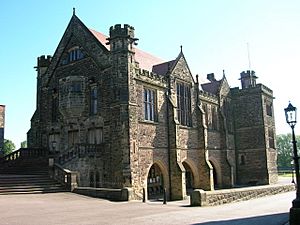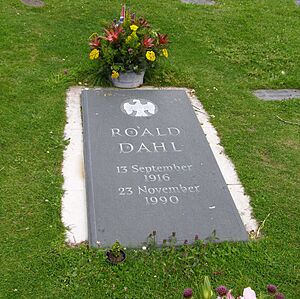Roald Dahl facts for kids
Quick facts for kids
Roald Dahl
|
|
|---|---|
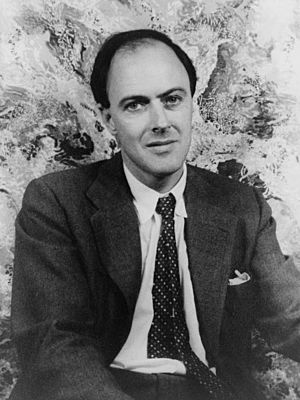
Dahl in April 1954
|
|
| Born | September 13, 1916 Cardiff, Wales |
| Died | November 23, 1990 (aged 74) Oxford, England |
| Occupation | Novelist, Poet, Screenwriter |
| Education |
|
| Period | 1942–1990 |
| Genre | Fantasy |
| Notable works | |
| Spouse |
|
| Children | Olivia, Tessa, Theo, Ophelia and Lucy |
| Relatives | Sophie and Phoebe Dahl (granddaughters) Nicholas Logsdail (nephew) |
| Signature | |
 |
|
| Military career | |
| Allegiance | |
| Service/ |
|
| Years of service | 1939–1946 |
| Rank | Squadron Leader |
| Unit | No. 80 Squadron RAF |
| Battles/wars | |
Roald Dahl (September 13, 1916 – November 23, 1990) was a famous British writer. He wrote novels, short stories, poems, and screenplays. He was also a brave fighter pilot during World War II. His family came from Norway.
Dahl's books have sold over 250 million copies worldwide. Many people call him "one of the greatest storytellers for children of the 20th century." His short stories often have surprising endings. His children's books are known for being funny and sometimes a bit dark.
Some of his most loved children's books include James and the Giant Peach, Charlie and the Chocolate Factory, Matilda, The Witches, and Fantastic Mr Fox.
Contents
Roald Dahl's Early Life
Growing Up in Wales
Roald Dahl was born in 1916 in Cardiff, Wales. His parents, Harald and Sofie, were from Norway. His father was a rich shipbroker. Roald was named after a famous Norwegian explorer, Roald Amundsen. Norwegian was his first language, and he spoke it at home.
In 1920, when Roald was three, his older sister Astri died. A few weeks later, his father died from pneumonia. Roald's mother decided to stay in Wales. She wanted her children to get an English education, which his father believed was the best.
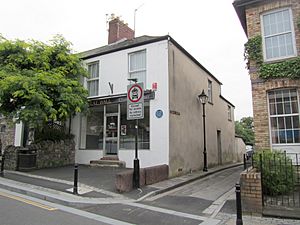
Roald first went to The Cathedral School, Llandaff. When he was eight, he and four friends played a prank. They put a dead mouse in a jar of gobstoppers at a sweet shop. The shop owner, Mrs. Pratchett, was known for being mean. This prank was called the "Great Mouse Plot of 1924." Roald later used this memory in Charlie and the Chocolate Factory. He wrote about the everlasting gobstopper in that book.
After this, Dahl was sent to St Peter's boarding school. He did not like it there. But he never told his mother in his weekly letters.
School Days at Repton
In 1929, when he was 13, Dahl went to Repton School in Derbyshire. He was not seen as a great writer then. But he loved reading and photography. He was very tall, growing to be 6 feet 6 inches as an adult. He played many sports like cricket, football, and golf. He was even captain of the squash team.
While at Repton, the Cadbury chocolate company sent new chocolates to the school. Students would test them. Dahl dreamed of inventing a new chocolate bar. This idea later inspired his book, Charlie and the Chocolate Factory (1964).
Dahl noticed that older boys at Repton were often cruel to younger ones. He wrote about these experiences in his book Boy: Tales of Childhood. Some people think this is why many of his children's stories feature mean adult villains.
Life After School
After school, in 1934, Dahl traveled across the Atlantic. He hiked through Newfoundland with the British Exploring Society. He also worked for the Shell Oil Company. After two years of training, he was sent to live in Mombasa, Kenya. Then he moved to Dar es Salaam in Tanganyika (now part of Tanzania). He had his own cook and servants there.
Roald Dahl: Fighter Pilot
In November 1939, Dahl joined the Royal Air Force (RAF). He became an aircraftman. After his training, he became a pilot officer in August 1940. He was ready to fight the enemy.
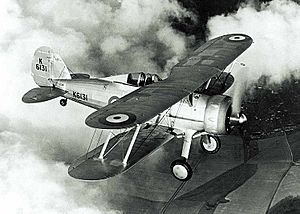
On September 19, 1940, Dahl's plane crashed in Libya. His skull was fractured, and his nose was broken. He was temporarily blind. He managed to get away from the burning plane before losing consciousness. It turned out he had been sent to a dangerous area between Allied and Italian forces by mistake. He later wrote about this crash in his first published story.
Dahl shot down five enemy aircraft. This made him a "flying ace." He likely shot down even more planes on April 20, 1941. That day, 22 German aircraft were shot down.
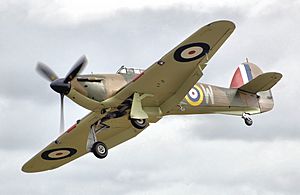
Diplomat, Writer, and Spy
After his injuries, Dahl was sent to an RAF training camp. He tried to get well enough to become an instructor. In March 1942, he met Major Harold Balfour in London. Balfour was impressed by Dahl's war record and how well he spoke. He made Roald an assistant air attaché at the British Embassy in Washington, D.C..
During the war, Dahl sent important information from Washington to Prime Minister Winston Churchill. Towards the end of the war, Dahl wrote about a secret organization he was part of.
Family Life
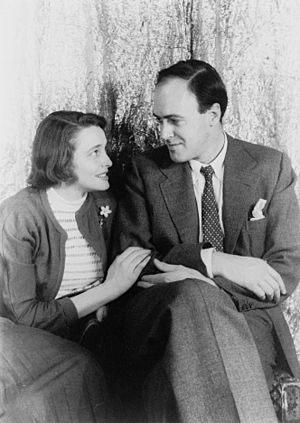
Dahl married American actress Patricia Neal on July 2, 1953. They were married for 30 years and had five children:
- Olivia Twenty (1955–1962)
- Chantal Sophia "Tessa" (born 1957), who became an author. Her daughter, Sophie Dahl, was the inspiration for Sophie in The BFG.
- Theo Matthew (born 1960)
- Ophelia Magdalena (born 1964)
- Lucy Neal (born 1965)
Dahl helped create a special device called the "Wade-Dahl-Till" (WDT) valve. This device helps reduce pressure in the brain for children with hydrocephalus. He did this because his son Theo suffered from hydrocephalus after a taxi hit his baby carriage. The WDT valve has helped nearly 3,000 children worldwide.
In 1962, Dahl's daughter Olivia died at age seven from a serious illness caused by measles. Three years later, his wife Patricia had three brain aneurysms while pregnant. Dahl took care of her as she learned to talk and walk again.
In 1983, Patricia Neal and Dahl divorced. Dahl then married Felicity d'Abreu Crosland, known as Liccy. She was a set designer who had worked with Patricia.
Roald Dahl's Writing Career
Dahl's first published story was about his wartime adventures. It was called "A Piece of Cake." The Saturday Evening Post bought it and published it as "Shot Down Over Libya."
His first children's book, The Gremlins, came out in 1943. It was about mischievous creatures from Royal Air Force stories. Dahl went on to write many beloved children's books. These include Charlie and the Chocolate Factory, Matilda, James and the Giant Peach, The Witches, Fantastic Mr. Fox, The BFG, The Twits, and George's Marvellous Medicine. Famous people like Tim Burton and Steven Spielberg say Dahl's stories influenced them.
Dahl also wrote dark and funny short stories for adults. These often had surprising plot twists. He wrote more than 60 short stories.
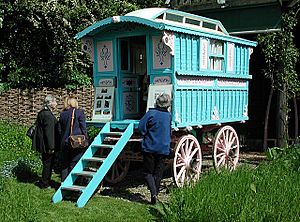
His last book published during his lifetime was Esio Trot in 1990. This book was different. It was a sweet story about an old man trying to connect with a woman he admired.
Writing for Children
Dahl's children's books are usually told from a child's point of view. They often feature adult villains who are mean to children. But there is usually at least one "good" adult to help the child. Dahl also often included very fat characters, usually children.
Dahl wanted his readers to use their imaginations. He was famous for his creative and playful use of language. He made up many new words that sounded familiar. For example, something "lickswishy" and "delumptious" is good to eat. But something "uckyslush" or "rotsome" is definitely not!
Writing for the Screen
For a short time in the 1960s, Dahl wrote screenplays for movies. He adapted two novels by Ian Fleming: the James Bond film You Only Live Twice and Chitty Chitty Bang Bang.
Dahl's own novel Charlie and the Chocolate Factory was made into the movie Willy Wonka & the Chocolate Factory (1971). Dahl did not like this movie. He felt the story was changed too much. He was upset that it focused too much on Willy Wonka and not enough on Charlie.
Who Influenced Roald Dahl?
When he was younger, Roald loved to read. He enjoyed exciting stories about heroes. His favorite authors included Rudyard Kipling, Charles Dickens, and Lewis Carroll. Their books left a lasting mark on his life and writing.
Dahl said his mother and her stories also greatly influenced him. She used to tell him traditional Norwegian myths and legends. This helped him develop a love for ghost stories. He based the grandmother character in The Witches on his own mother as a tribute.
Roald Dahl on TV
In 1961, Dahl hosted and wrote for a science fiction and horror TV show called Way Out. He also wrote for the BBC comedy show That Was the Week That Was. From 1979 to 1988, a TV series called Tales of the Unexpected aired. This show was based on Dahl's short stories.
Death and Legacy
Roald Dahl died on November 23, 1990, at age 74. He had a rare blood cancer called myelodysplastic syndrome. He was buried in the cemetery at the Church of St Peter and St Paul, Great Missenden, England. Even today, children leave toys and flowers by his grave.
In September 2021, Netflix bought the Roald Dahl Story Company for over $686 million.
Many places and things have been named after Roald Dahl:
- The Roald Dahl Children's Gallery
- An asteroid called 6223 Dahl
- The Roald Dahl Plass (a public space in Cardiff)
- Roald Dahl's Marvellous Children's Charity
- The Roald Dahl Museum and Story Center
- The Roald Dahl Funny Prize
- "Roald Dahl Day," celebrated on his birthday, September 13
- Special postage stamps in 2010 and 2012
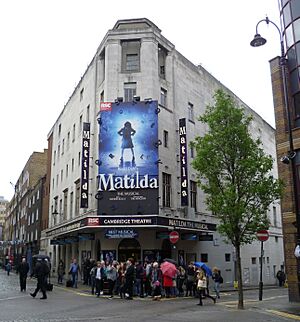
Awards and Recognitions
Roald Dahl has received many honors:
- He was named the sixteenth of the 50 greatest British writers since 1945 by The Times.
- He is one of the world's best-selling fiction authors.
- In 2000, he was voted Britain's favorite author.
- In 2016, he was one of Amazon's top five best-selling children's authors online.
- A 2017 UK poll named him the greatest storyteller of all time. He ranked higher than Dickens, Shakespeare, Rowling, and Spielberg.
- In 2021, Forbes named him the top-earning dead celebrity.
Famous Roald Dahl Quotes
- "Those who don't believe in magic will never find it."
- "Life is more fun if you play games."
- "A person who has good thoughts cannot ever be ugly. You can have a wonky nose and a crooked mouth and a double chin and stick-out teeth, but if you have good thoughts they will shine out of your face like sunbeams and you will always look lovely."
- "So please, oh please, we beg, we pray, go throw your TV set away, and in its place you can install a lovely bookshelf on the wall. Then fill the shelves with lots of books."
- "Having power is not nearly as important as what you choose to do with it."
- "If you are going to get anywhere in life you have to read a lot of books."
Fun Facts About Roald Dahl
- Dahl wrote many of his stories in a small shed in his garden.
- He never learned to type. He wrote everything in a red book with a pencil.
- Dahl invented over 250 new and fun words. There is even a dictionary, the Oxford Roald Dahl Dictionary, that lists his words.
- Many of Dahl’s characters were based on real people he had met.
- In 1971, a real postman from Nebraska named Willy Wonka wrote to Roald Dahl.
- His nickname in the Royal Air Force (RAF) was "Lofty."
- The famous book James and the Giant Peach was almost called James and the Giant Cherry.
Film and TV Work
Writing and Story Roles
Roald Dahl wrote stories and screenplays for several TV shows and movies:
- Suspense (1950)
- Alfred Hitchcock Presents (1958–61)
- Way Out (1961)
- You Only Live Twice (1967 film)
- Chitty Chitty Bang Bang (1968 film)
- Willy Wonka & the Chocolate Factory (1971 film)
- Tales of the Unexpected (1979–88 TV series)
- The BFG (1989 TV movie)
- Danny the Champion of the World (1989 TV movie)
Appearances on TV
Roald Dahl also appeared on television as himself:
- The 41st Annual Academy Awards (1969)
- Read All About It (1978)
- This Is Your Life (1978)
- Tales of the Unexpected (1979–85)
- Going Live! (1989)
Publications
See also
 In Spanish: Roald Dahl para niños
In Spanish: Roald Dahl para niños
 | Emma Amos |
 | Edward Mitchell Bannister |
 | Larry D. Alexander |
 | Ernie Barnes |


